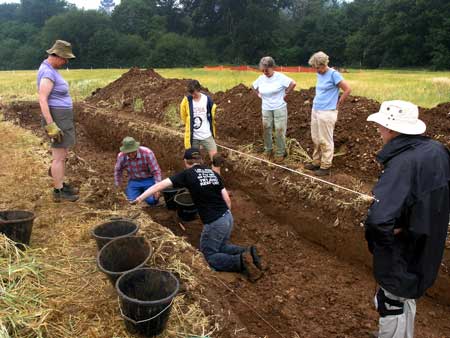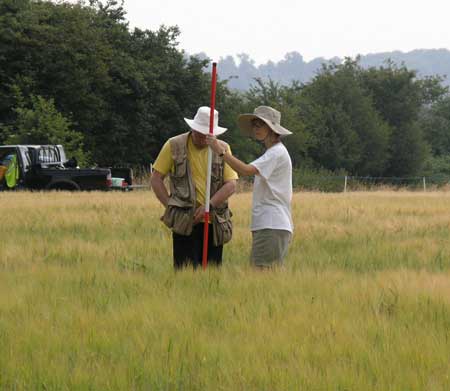
Fieldwork - News plus basic information
Fieldwork News
MAG supported the University of Reading geophysical survey of Cockmarsh in Cookham this April/May and this revealed the presence of another barrow and some intriguing linear features. It is hoped to extend the investigations and further details will be posted when they are known.
We are involved, together with other local archaeological societies, with the University of Reading investigations at Church Paddock. This commenced on 24 July with help in setting up the site prior to the University’s Field School. This year, a trench has been opened specifically for volunteers who expressed interest an interest gaining fieldwork experience. The University’s Field School that runs from 7 August to 2 September and visitors are welcome: interest should grow after the first week.
There may be opportunities for involvement in the garden test pit programme in Cookham that is linked to the Cookham project, This is a good route for those new to fieldwork to get some basic experience of excavation and all that is involved in fieldwork.
And lastly, also in association with the University, MAG has offered support for a research project on River Thames depositions. If you would like to get involved, let us know at info@marlowarch.co.uk
Basic Information
This is a brief outline of the background to fieldwork and its conduct. There are more detailed fieldwork guidelines and information that should be consulted also. (for an excellent free PDF download on "KEY CONCEPTS INPUBLIC ARCHAEOLOGY" please click here)
- We invariably work on someone's property with their agreement, so our activities and behaviour must reflect and respect this arrangement.
- The health and safety of our members and members of the public is paramount when undertaking fieldwork.
- Excavation disturbs, damages or destroys the archaeology, so must be approached and executed with care.
- The directions and instructions of the site supervisor must be followed.
- Always sign in on arrival and sign out when leaving site.
- Observe any special site instructions.
- Familiarise yourself with the society's fieldwork protocols.
- Use tools only for the purpose intended and be aware of others during use.
- Be aware of stringlines, tapes, cables, pegs and level differences.
- Keep the site tidy.
- If you perceive a risk, report it.
- If in doubt, ask.
What to wear and take

Archaeological fieldwork involves exposure to the weather, so be prepared for that on the day, remembering that we live in a changeable climate. Be adequately protected against the cold, wet or heat and strong sunshine as appropriate, in respect of both clothing and head wear.
-
Excavation inevitably involves a certain amount of dirt; make sure your clothing will not be spoilt by getting dirty and will be comfortable kneeling and/or using tools.
-
We recommend using gloves when excavating, to protect the skin from possible blisters, abrasions and cuts. Basic first aid is always available on site.
-
Stout footwear is essential, preferably with ankle support.
-
Remember to take any medication that you need.
-
In many cases sites are remote from shops, so bring food and drink sufficient for your needs.
-
Bring a lightweight chair for rest and meal breaks, or be prepared for sitting on the ground.
-
Bring your own trowel if you have one and a kneeling pad or knee pads. However a trowel and kneeling pad can be provided for the day. All heavy tools are provided by the society.
-
Be aware that it is often not possible to provide toilet facilities, including hand washing facilities.
-
In the unlikely event that hard hats are needed, these will be provided by the society. Safety glasses are rarely required.
-
It is usually allowable to take photographs: any restrictions will be advised.